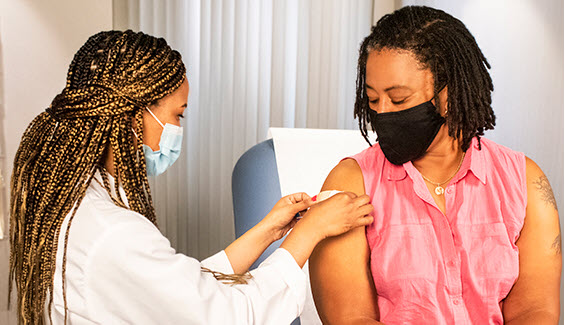Hopefully you’ve been able to get your vaccine by now. Or you’re making plans to get it.
You’ve made it through the side effects, which hopefully weren’t as severe as you had feared. So, now you can go back to the life you had in the “before-times.” Or can you?
It’s a great place to be, but there are still some things for you to consider. Such as the fact that It takes a few weeks to develop immunity. And at a time when COVID remains rampant and many people are still not immunized, it’s essential to take as many precautions as you can.
Taking the right safety precautions can keep you and the people around you free from COVID-19. The following are recommendations from the nation’s top scientists about what’s possible for you after receiving your vaccines.
So, the truth is, masks are still going to be around for a long time. You’ll still have to wear a mask even though you’ve had a vaccine. The following are some reasons why masks remain necessary.
Vaccines Don’t Provide 100% Protection
A vaccine doesn’t provide full protection against SARS-CoV-2, the virus that causes COVID-19. Although it offers close to 100% immunity, there’s still a remaining 5% chance that a person can get infected. That 5% chance might sound slim, but it translates that out of 100 people who receive the vaccine — 5 of them still become infected.
In addition, scientists aren’t sure if being vaccinated means you can’t spread COVID-19. Some people may be a carrier of the virus and show no symptoms. People who are vaccinated may still have viruses in their nasal passages but not have any signs of illness. When these people talk or sneeze, they can still spread virus particles.
No One Knows How Long Immunity Will Last
COVID-19 — and all that comes with it — is new for everyone, including scientists. How long immunity to COVID-19 lasts is unknown, and booster shots may be necessary to keep immunity to the coronavirus at an adequate level. Until researchers understand more about how immunity to SARS-CoV-2 works, it’s best to wear a mask — even after you’ve received your vaccine.
Every person is different and this includes people from the same family. A person’s genetic makeup, immune response, health status, and environmental influences are not the same as the next person,
For example, the first dose of the vaccine creates an immune response in most people. Still, some are non-responders, so the second dose is crucial because it fosters an immune response even in people who were initially not responsive. Because you don’t know how effective the vaccine will be for you or how you’ll respond to a coronavirus exposure, it’s safest to wear a mask.
Getting Together with Family and Friends
We’ve all missed greeting others without worrying about COVID transmissions. And if you’ve been pining away for a hug, you’re not alone. Fortunately, receiving the vaccine might be the key to getting more of them.
It’s safe to see others who have been vaccinated, with a recommendation that everyone wait a few weeks after they’ve received the vaccine. In addition, people who have received the vaccine can visit friends and family at outdoor get-togethers. Indoor gatherings, however, still carry a level of risk. Although the risk is lower if a person is vaccinated, Vaccinated people can still become infected with the coronavirus and, perhaps, spread it to unvaccinated people. An ideal way to see family and friends is outdoors or in a well-ventilated area, wearing a mask and maintaining social distancing.
Indoor Dining and Bars
The reason indoor dining is frowned upon by public health officials isn’t that food spreads COVID. It’s because the act of eating and drinking can spread the virus into the air. When people eat and drink, they can’t wear a mask. Therefore, their own droplets can flow into the air, and they can breathe in droplets from the people around them. These droplets can contain the coronavirus. The same scenario also applies to bars. And because restaurants and bars are social areas, people tend to do a lot of talking to each other, laughing out loud, hugging, or shaking hands — all without masks.
Most indoor restaurants and bars also lack good air circulation. This factor increases the chances of an infection, even in places where ventilation is thought to be adequate.
So, in summary, there’s a higher chance of getting COVID indoors around many people, even if you’re vaccinated. Though your chances of getting an infection are significantly lower than that of someone who didn’t have the vaccine, you can still get the virus. Inadequate ventilation allows the coronavirus to multiply and spread. So, when eating at restaurants, continue to wear a mask when not eating and practice social distancing.
Traveling
The Centers for Disease Control and Prevention (CDC) still maintains that it’s currently not a good time to travel, with or without a vaccine. The CDC advises avoiding all kinds of non-urgent travel if possible, both domestically and internationally. So perhaps you may keep that holiday on hold.

Getting a vaccine may not confer full immunity to COVID-19. Still, it will drastically reduce the likelihood that you will become infected with the coronavirus or — if you do become infected — lower the risk that you will have severe symptoms. And if enough of the population receives COVID-19 vaccines, the greater the chance that we can all resume activities that we all miss dearly. The vaccines are good news, but we still have to do our part to help each other.







